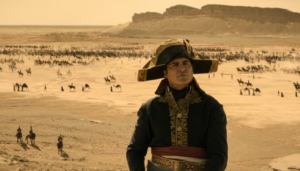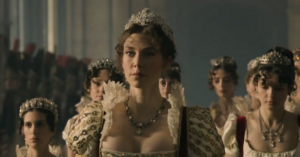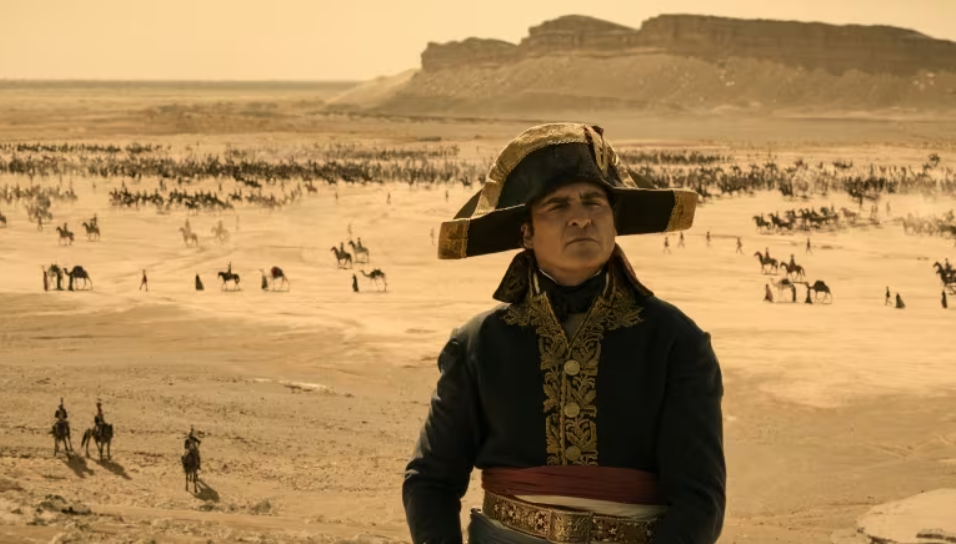Film Review
Other than the classic 1927 silent film and a 1955 French production, there has never been a serious attempt to make a sweeping epic biopic of the infamous French conqueror Napoleon Bonaparte. Stanley Kubrick considered such a project, but never brought it to fruition. His version likely would have been exemplary however, as Kubrick excelled at stories about those who reach great heights only to fall from grace. For that matter, Martin Scorsese could have done a number with the Napoleon saga.
But now, over two centuries after his death, British director Ridley Scott has churned out “Napoleon” starring Joaquin Phoenix as the great leader – and right here in thick of this year’s Oscar race. Scott would seem a natural fit for the material, as he often specializes in big dramatic battle scenes. Think “Gladiator,” “Kingdom of Heaven,” or “Black Hawk Down.” True to form, Napoleon’s battles in Toulon, Egypt, Waterloo, and especially the 1805 Battle of Austerlitz do not disappoint. As the cannon fire across the screen, we see throngs of men and horses meet their demise under the strong hand of our protagonist.
Given the remarkable pedigree of this effort, why did I leave the theatre so exceedingly underwhelmed? What went wrong? Why does a 2.5-hour exploration of one of the most brilliant military minds in world history leave us so unfulfilled? Most of it is Scott’s fault, and some of the blame must be attributed to Phoenix – although he is undoubtedly following the direction given to him.
While Scott excels at large-scale productions, he’s never been a director to wallow in small, personal stories. Even a more touching Scott film like “The Martian” was really more a story of how Matt Damon’s abandoned astronaut character used his brain and his ingenuity to safely return to earth – rather than a study of the man himself. And Sigourney Weaver’s iconic character in “Alien” used her smarts to keep from being devoured by the alien creature, but we never learned anything about her personally.
So why did Scott think he was the right director for an epic film about Napoleon Bonaparte? Historical dramas practically beg for personal stories. What makes them tick? What personal baggage do they bring to the proverbial table which leads to their greatness – and often to their defeat? I offer David Lean’s Oscar winner “Lawrence of Arabia” as an example. We learn just enough back story about T.E. Lawrence to make us eager to see how he carried out the Arab Revolt during the first world war. In “Napoleon,” we don’t learn anything about the lead character. Nothing.
In fact, Napoleon is presented as a brilliant military mind during the power vacuum which followed the French Revolution in the 1790s. We have no idea why he possessed a brilliant military mind; just that he did. Nor do we learn why he had an obsession with power. Why couldn’t he be content simply leading the French army? Why did he possess the desire to lead the entire country? Why did he want to conquer other European countries? What drove him to Russia in 1805? You’d think a 2.5-hour epic historical drama might be able to offer some answers. Instead, we are “treated” to ever more grusome, overblown battle scenes. While Austerlitz is a highlight, by the time Naploeon meets his demise at Waterloo, we’ve almost stopped caring.
Again, part of the blame must be laid at the hands of Phoenix – one of our greatest living actors, but one who often excels in small, personal, intimate character studies. Still, he is more than capable of displaying a wide range of emotion, as he did in his Oscar-worthy performance in Paul Thomas Anderson’s 2012 classic “The Master.” Why couldn’t Phoenix have demonstrated some of that raw energy here? His Napoleon seems half asleep through much of the film, even when leading his men into battle. Did Scott ask for an annoyed and exasperated performance? I can’t imagine why, but that’s what he received from Phoenix.
And there’s been supporting actress nomination talk surrounding British actress Vanessa Kirby as Josephine. But her skills are wasted in a role relegated to her unsuccessful efforts to bear Napoleon an heir to the throne. And it’s not for lack of trying. I can’t recall the last time I witnessed such uninspired and methodic sex in a motion picture. Not once do we experience any sense of love between these two characters. Even their initial meeting is activated by their respective good looks than by any emotional connection between the two.
What a missed opportunity! Ridley Scott’s “Napoleon” is likely to go down as one of the most disappointing and underachieving historical dramas ever produced for the big screen. It’s that bad. Bradley Cooper directs and stars in an upcoming biopic of the great conductor and composer Leonard Bernstein called “Maestro.” One can only hope Cooper has concentrated on more than simply showing us dramatic orchestral concerts. I’d like to learn something about Bernstein the man. One can only hope…





